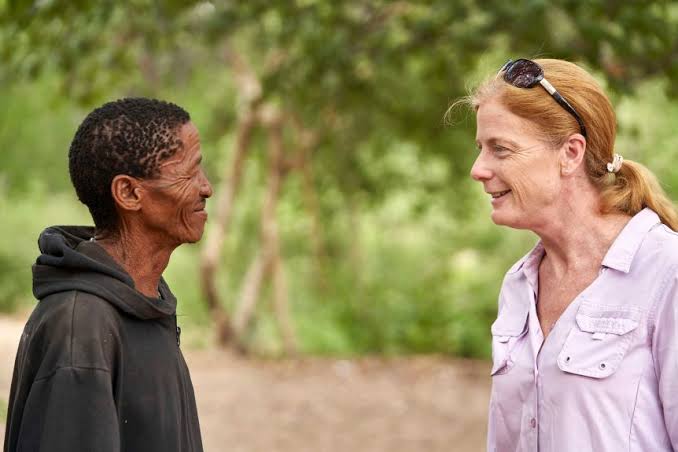
Today, the land south of the Zambezi River is dry and inhospitable. Only a collection of large salt pans hint at what the area was like in the past.
But if you could travel back in time 200,000 years, you would see a lush wetland the size of New Zealand stretching across what is now northern Botswana, heading into Namibia in the west and Zimbabwe in the east.
It was home to giraffes, lions and zebras — and new Australian-led research suggests it was also the birthplace of the earliest ancestors of our own species: anatomically modern humans.
The study, published in Nature this morning, used DNA sequencing cross-referenced with other information, including geological and climate data, to pinpoint the origin of our earliest maternal lineage, known as L0.
Mitochondrial DNA, which is found in the mitochondria or “batteries” of our cells, is only passed down to you from your mother. Whereas your nuclear DNA, found in the nuclei of your cells, you inherit from both parents.
“We’ve known for a long time that modern humans originated in Africa, and roughly 200,000 years ago, but what we hadn’t known until this study was where exactly this homeland was,” said Garvan Institute geneticist Vanessa Hayes, a co-author of the paper.
We also weren’t sure where our ancestors travelled to next, and this research sheds light on that too.
“This wetland … was actually an oasis in a desert,” Professor Hayes said.
It was completely surrounded by a very uninhabitable area, which led to our hunter-gatherer ancestors staying put for some 70,000 years.
Then 130,000 years ago the climate began to change, first opening up a green corridor to the northeast, and 20,000 years later to the southwest.
This matches the divergence we see in the genetic data around this time as well, so the scientists are confident that this is when the first migrations out of our homeland began.
To trace our very earliest origins, the researchers collected blood samples from study participants in Namibia and South Africa, looking for people who carry markers of the L0 lineage or rare L0 sub-lineages.
When a screened participant was shown to have one of these known markers, the team sequenced their whole mitochondrial genome or mitogenome, enabling them to contribute 198 new mitogenomes to the current L0 database of over 1,000.
They already knew that the KhoeSan from southern Africa carried the L0 lineage, but they wanted to look more widely than that.
“We actually set out to look for rare lineages in people who today don’t identify as KhoeSan,” said lead author Eva Chan, a statistical geneticist also at the Garvan Institute.
This helped Dr Chan and her colleagues unravel the complexity of a lineage stretching back 200,000 years.
“This is the longest living lineage of our human history,” said Professor Hayes.
“It can’t just be as simple as KhoeSan as one people, so we really had to tease that out,”
Mitochondrial DNA is relatively short, consisting of a modest 16,000 DNA base pairs — compared to the three billion base pairs of our regular genome, found inside the nucleus.
It also has a slightly higher mutation rate, which means geneticists can extract more information from each generation, Dr Chan said.
This mutation rate allows scientists to use the mitochondrial DNA as a clock, to estimate a timeline for how the lineage developed and diverged.
“And because [the mitogenome] is small and abundant in human cells, we can actually sequence a lot of individuals and get a lot of information,” Dr Chan said.
Does this settle the debate about where we came from?
In the long debate about where our species originated, the data always points back to southern Africa. That’s because the most genetically diverse populations are found there, Professor Hayes said.
“The closer we get to our human origins, the more diverse the population is going to be because they’ve had a longer time to acquire mutations,” she said.
“Based on the current data, I do believe that southern Africa is the most logical origin … of the founder population of L0 — and everyone walking around today.”
While other human lineages may have split off from L0 and then gone extinct, we don’t have any information from these people.
“We are just talking about the survivors of the last 200,000 years,” Professor Hayes said.
The paper is significant because it reports a new set of mitogenomes, said evolutionary biologist David Lambert, of Griffith University, who was not involved in the study.
But he thinks using only mitogenomes was a limitation of the work, and being able to pinpoint the timing of events using only the sequence of mitochondrial DNA is a “debatable proposition”.
“The really powerful stuff is when you use whole genomes, and I think that’s the next step,” Professor Lambert said.
Archaeological scientist Ian Moffatt of Flinders University was also intrigued by the research, but would have liked to see more information about how the archaeology of the region puts the genetic results in context.
“For me, the big take home message from this paper, and the exciting part of it is to say, this is a question that begs further investigation, both from a geological and an archaeological point of view,” Dr Moffat said.
Dr Chan agrees that additional archaeological and nuclear DNA data could give rise to different stories and hypotheses about our origins.
“One day we’ll be able to have the computational power to combine all these pieces of information together, [and get] an even clearer picture of our history, and that will be a great day.”
You may be interested

AFCON 2025Q: New Boy Osho, Iheanacho, Start For Super Eagles Vs Benin Republic
Webby - November 14, 2024The Super Eagles will line-up in a 3-4-3 formation in tonight’s 2025 Africa Cup of Nations qualifying tie against Benin…

My Goal Was To Achieve Success With Ten Hag At Man United –De Ligt
Webby - November 14, 2024Netherlands international Matthijs de Ligt has suggested Erik ten Hag didn’t get the breaks he needed to keep his job…

I Want To Take My Game To New Level –Lookman
Webby - November 13, 2024Super Eagles winger Ademola Lookman has reiterated his commitment to take his game to the next level.The Nigerian international, who…






















![American Pastor, David Wilson Seen Eating The Box Of Woman Who Isn’t His Wife [Video]](https://onlinenigeria.com/wp-content/uploads/2019/10/american-pastor-david-wilson-seen-eating-the-box-of-woman-who-isnt-his-wife-video-150x150.jpg)









